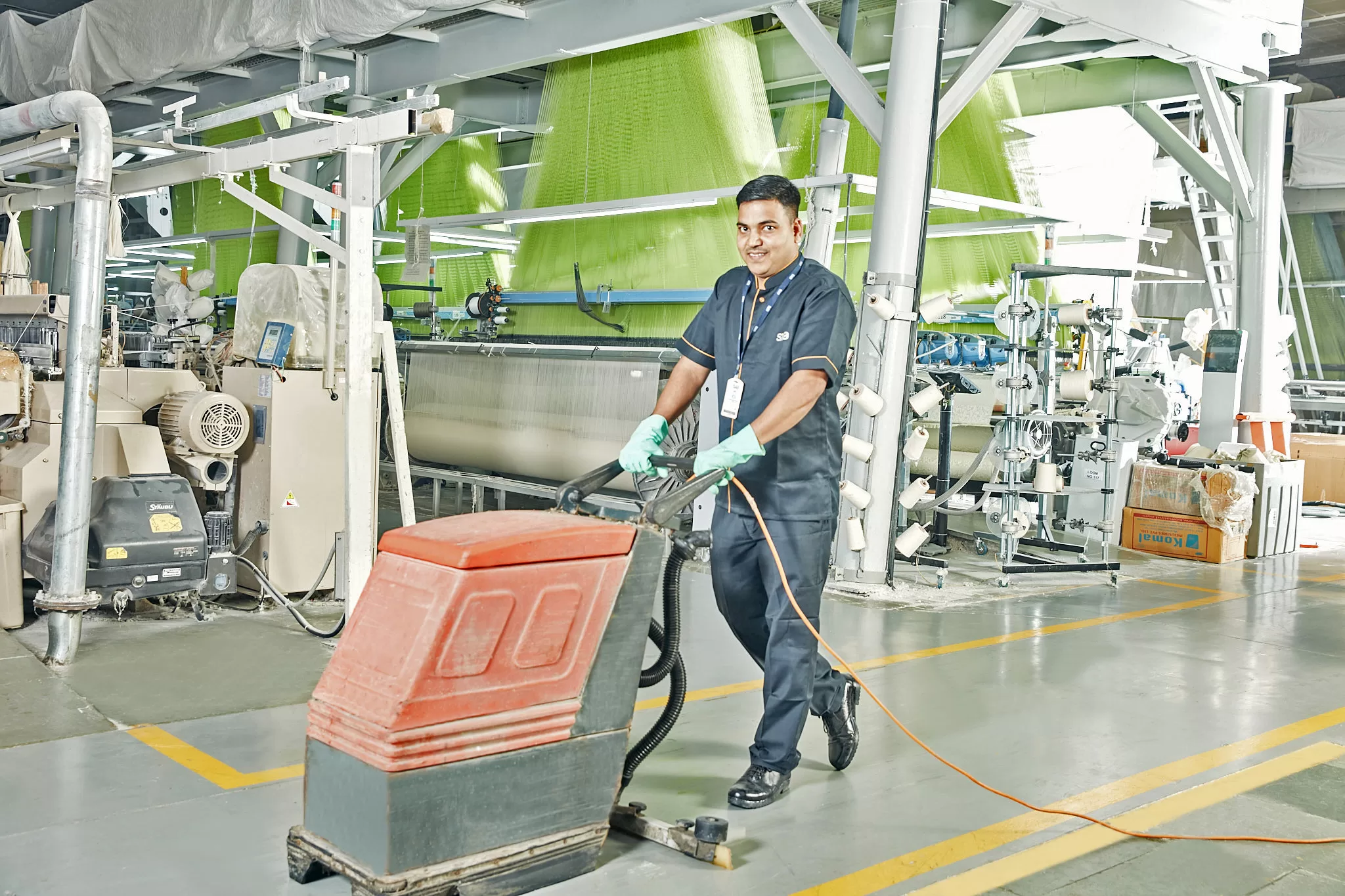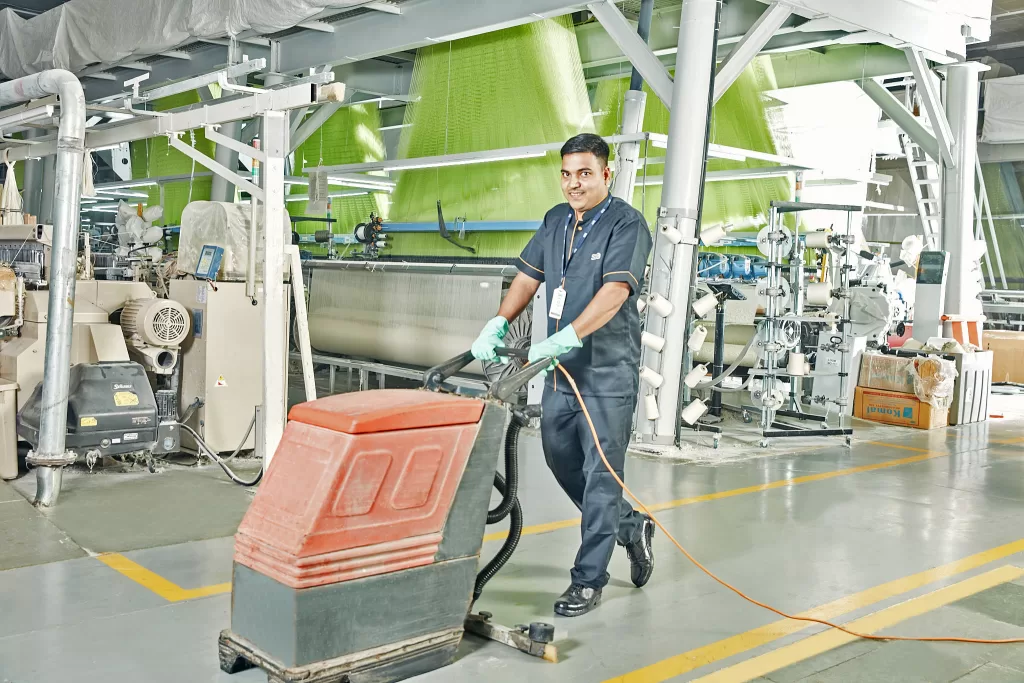
Introduction
In the fast-paced textile industry, facility management plays a crucial role in maintaining high standards of production and efficiency. Mastering maintenance is essential for elevating the performance and productivity of textile factories. Whether you are looking for facility management services in Mumbai or Bangalore, or seeking integrated facility management solutions, this blog post will provide you with expert tips to help you enhance your facility management practices and ensure optimal operations at your textile factory. From top facility management companies in India to housekeeping services near you, we’ve got you covered. Read on to discover how you can take your textile factory to the next level with effective facility management strategies.
The importance of maintaining high standards in a textile factory
Maintaining high standards in a textile factory is of utmost importance for several reasons. First and foremost, it ensures that the products meet the quality expectations of customers. In the competitive textile industry, delivering subpar products can lead to a loss of trust and ultimately affect the reputation of your factory.
Secondly, maintaining high standards enhances the overall efficiency and productivity of your operations. Regular maintenance helps minimize downtime and equipment failures, allowing for smooth and uninterrupted production processes.
Moreover, high standards contribute to a safe and healthy working environment for your employees. By focusing on safety measures, you not only protect them from hazards but also enhance their morale and job satisfaction.
Lastly, maintaining high standards also leads to cost savings in the long run. By preventing the need for frequent repairs and replacements, you can maximize the lifespan of your machinery and equipment, resulting in reduced expenses.
Tip 1: Regular equipment maintenance
Regular equipment maintenance is the foundation for elevating standards at your textile factory. Developing a comprehensive maintenance schedule and adhering to it is crucial for identifying potential issues and addressing them before they escalate.
Start by creating a checklist of all machinery and equipment that require regular maintenance. This should include tasks such as cleaning, lubrication, and calibration. Assign specific responsibilities to your maintenance team or technicians to ensure accountability.
Investing in preventive maintenance software can streamline the process by automating scheduling and sending reminders for upcoming tasks. This will help you stay on top of maintenance activities and ensure nothing falls through the cracks.
Regular equipment maintenance not only improves the lifespan and performance of your machinery, but it also minimizes the risk of unplanned downtime. By taking a proactive approach, you can avoid costly repairs and keep your production processes running smoothly.
Tip 2: Implementing a comprehensive cleaning schedule
Maintaining a clean and organized factory environment is essential for elevating maintenance standards at your textile factory. Implementing a comprehensive cleaning schedule is not only crucial for hygiene and safety but also for the longevity of your machinery.
Start by identifying the areas that require regular cleaning, such as the production floor, storage areas, and equipment surfaces. Develop a detailed checklist of tasks that need to be completed, such as sweeping, vacuuming, wiping down surfaces, and removing debris.
Assign dedicated cleaning personnel or designate specific time slots for your production team to perform these cleaning tasks. Regularly monitor and evaluate the cleanliness of your factory to ensure that the schedule is being followed.
Implementing a comprehensive cleaning schedule will not only create a better working environment for your employees but also prevent the accumulation of dust and debris, which can lead to equipment malfunctions and breakdowns.
Tip 3: Investing in employee training and education
To truly elevate maintenance standards at your textile factory, it’s crucial to invest in the training and education of your employees. Providing them with the knowledge and skills they need will not only enhance their performance but also equip them to effectively address maintenance issues.
Start by conducting a thorough assessment of your employees’ current skill levels and identify areas where additional training is needed. This could include technical skills related to operating and maintaining machinery, as well as knowledge about maintenance best practices and safety protocols.
Consider partnering with industry experts or consultants who can provide specialized training sessions tailored to the needs of your textile factory. This could involve workshops, on-the-job training, or online courses that allow your employees to learn at their own pace.
Remember, investing in employee training and education not only benefits the individuals themselves but also has a direct impact on the overall efficiency and productivity of your factory.
Tip 4: Utilizing quality control measures
In order to further elevate the maintenance standards at your textile factory, it is essential to implement robust quality control measures. These measures will ensure that the products leaving your factory meet the highest standards of quality and it will also help reduce the occurrence of maintenance issues caused by faulty products.
Start by establishing clear quality control protocols that cover every step of the manufacturing process. This includes inspections at each stage, from raw material intake to finished product packaging. Implementing regular and thorough quality checks will catch any defects or issues early on, allowing for prompt action and minimizing the risk of maintenance problems down the line.
Consider investing in quality control equipment and technology to enhance your monitoring capabilities. This could include automated inspection systems, quality control software, or even hiring dedicated quality control staff to oversee the process.
By utilizing quality control measures, you are not only ensuring the satisfaction of your customers but also actively preventing maintenance issues from arising due to subpar products.
Tip 5: Embracing technology for improved maintenance
In today’s rapidly advancing technological landscape, embracing the right tools and equipment can greatly enhance maintenance efforts at your textile factory. By utilizing technology, you can streamline processes, optimize efficiency, and prevent potential issues before they become major headaches.
One key technology to consider is a computerized maintenance management system (CMMS). This software helps you track and manage maintenance tasks, schedule preventive maintenance, and keep detailed records of repairs and equipment history. With a CMMS, you’ll have real-time visibility into maintenance activities, allowing you to make data-driven decisions and allocate resources more effectively.
Investing in condition monitoring systems is another valuable step towards improved maintenance. These systems use sensors and advanced algorithms to detect changes in equipment conditions, providing early warnings of potential failures. By identifying issues in their early stages, you can take proactive measures to prevent breakdowns, reduce downtime, and extend the lifespan of your machinery.
Additionally, consider implementing smart sensors and Internet of Things (IoT) technology. These interconnected devices can monitor various factors such as temperature, humidity, and vibration, providing valuable data on the health and performance of your machinery. By harnessing this data, you can identify patterns and trends, optimize maintenance schedules, and make informed decisions on when and how to allocate resources.
Expanding your use of technology can also involve embracing automation. Automated systems and robotics can perform tasks such as material handling, packaging, and even routine maintenance checks, reducing human error and freeing up your staff to focus on more complex maintenance tasks.
In conclusion, embracing technology is crucial for elevating maintenance standards at your textile factory. By incorporating tools such as a CMMS, condition monitoring systems, smart sensors, and automation, you can improve efficiency, prevent breakdowns, and ultimately optimize the overall performance of your factory.
Conclusion: Elevating maintenance standards for long-term success
In this blog, we have explored five expert tips for elevating maintenance standards at your textile factory. By implementing these strategies, you can ensure the long-term success and optimal performance of your operation.
By embracing these expert tips, your textile factory can establish and maintain elevated maintenance standards. This not only ensures smooth operations and minimizes disruptions but also enhances the overall profitability and competitiveness of your business in the long run.
SILA adopts a tech-driven approach, utilizing Robotics and IoT, Automated Compliance Management, and our proprietary technology (SILA Connect) to efficiently manage properties across India. As pioneers in technology within the facility management sector, SILA stands out as one of the best facility management service provider in India.
To delve deeper into our integrated facility management services, click here.
Industries We serve –
Commercial Offices & Buildings | Manufacturing & Heavy Industrial Facilities | Residential Complexes & Townships | Hotels & Campuses | Airports & Malls | IT Parks & Data Centres | Warehousing & Logistics Parks | Banks & Retail
Present in 125 cities –
Ahmedabad | Baroda | Bengaluru | Chennai | Bhubaneswar | Delhi | Gurugram | Noida | Kolkata | Hyderabad | Kochi | Mumbai | Pune & more
Get a free quote today, to reduce your facility cost.
FAQs -
1. What are the benefits of outsourcing Facility Management services?
Outsourcing FM services can provide specialized expertise, cost-effectiveness, access to advanced technology, scalability, and the ability to focus on core business activities while experts manage facility operations.
2. How do you measure the success of Facility Management?
Key performance indicators (KPIs) such as uptime of critical equipment, energy efficiency, maintenance costs, safety records, compliance levels, and overall productivity are often used to measure the success of FM practices.
3. What types of facilities or industries commonly utilize Operations & Maintenance services from Facility Management companies?
Various industries such as commercial offices, healthcare facilities, manufacturing plants, educational institutions, hospitality, retail, and residential complexes often rely on Facility Management companies for O&M services.
4. How do Facility Management companies ensure the quality of their Operations & Maintenance services?
Companies ensure service quality by employing skilled personnel, implementing standardized maintenance protocols, using advanced tools and technologies, adhering to industry best practices, and conducting regular performance evaluations.
About SILA -
SILA – A Real Estate platform driven by an entrepreneurial spirit.
Our businesses include Real Estate Services which offer Facility Management, Contracting Solutions and Real Estate Advisory. Our other business is Real Estate Development. We have a diverse client base in various sectors which include large Corporates, Real Estate Funds, Landowners and Developers.
Over the last decade, SILA has scaled efficiently, managing over 150 million square feet of assets, with over 20,000 employees pan India. The platform is backed by
Norwest Venture Partners and Samara Capital Group in our Real Estate Services and Development arms, respectively.
SILA is one of the best facility management service provider in Mumbai, Bengaluru, Delhi, Chennai, Hyderabad, Pune & more.














